- Home
- Barbara Pym
The Sweet Dove Died
The Sweet Dove Died Read online
The Sweet Dove Died
Barbara Pym
TO R.
Harper & Row, Publishers, New York
Cambridge, Philadelphia, San Francisco, Washington
London, Mexico City, Sao Paulo, Singapore, Sydney
THE SWEET DOVE DIED. Copyright © 1978 by Barbara Pym. All rights reserved.
First perennial library edition published 1980. Reissued in 1987.
Library of Congress Cataloging-in-Publication Data
Pym, Barbara.
The sweet dove died.
I. Title.
[PR6066.Y58S9 1987] 823’.914 86-45682
ISBN 0-06-097072-3 (pbk.)
87 88 89 90 91 MPC 10 987654321
I had a dove, and the sweet dove died;
And I have thought it died of grieving;
O, what could it grieve for? its feet were tied
With a single thread of my own hand’s weaving …
John Keats
I
‘The sale room is no place for a woman,’ declared Humphrey Boyce, as he and his nephew James sat having lunch with the attractive stranger they had picked up at a Bond Street sale room half an hour ago.
‘Now you’re scolding me,’ said Leonora, with mock humility. ‘I know it was stupid of me, but I suppose it was the excitement of bidding — for the first time in my life — and then getting that dear little book. It was just too overwhelming!’
‘And the room was so hot,’ James suggested, trying to take his part in the conversation, for after all it was he who had noticed the woman in black sway sideways and almost collapse at her moment of triumph, when she had challenged the auctioneer’s rather bored ‘Twenty pounds at the table?’ with a cry of ‘Twenty-five!’ Between them James and Humphrey had supported her out of the sale room and after that it seemed the natural thing for the three of them to be having lunch together.
Otherwise it had been a very boring sale, James thought. He had no interest in books and had spent the time idly watching the dealers, hunched over the table in their shabby clothes, making their bids with raised eyebrows or scarcely perceptible movements of hands or catalogues. The other bidders or spectators, mostly men, were crowded in rows on small chairs or standing in corners. A tall man with a slightly raffish air, leaning against the wall, had fixed his gaze on James and was staring at him every time James happened to glance in his direction. James lowered his eyes, feeling foolish but also a little flattered. He was not quite sure if he wanted that kind of admiration and found himself wondering if the diversion of Leonora’s near-collapse had saved him from a fate worse than death.
‘My dear Miss Eyre,’ Humphrey was saying, ‘the clerk of the sale would have taken a bid for you, or I’d gladly have done it for you myself if I’d known.’
‘How very kind of you—I’ll remember that another time. Do you have books in your antique shop?’ Leonora asked.
‘No. We specialise in porcelain and bronzes and small objects—you know the kind of thing.’
‘Objets d’art et de vertu,’ she murmured, with a delightful accent.
‘Exactly.’ Humphrey bent towards her admiringly to refill her glass with the hock he had chosen as being particularly appropriate to the occasion. That this exquisite creature should have been exposed to the contaminating presence of the dealers, for the sake of some trifling little Victorian flower book, hardly bore thinking of and filled him with horror. A book sale was certainly no place for a woman; had it been a sale of pictures or porcelain, fetching the sort of inflated prices that made headline news, or an evening sale —perhaps being televised—to which a woman could be escorted after being suitably wined and dined-that might have been another matter altogether.
‘And you . . .’ Leonora turned her gaze upon James. ‘You assist your uncle in his business?’
‘I’m trying to learn it,’ said James.
‘Yes, I thought a book sale might be useful experience for him,’ said Humphrey. ‘One sometimes comes across books at country house sales. What a fortunate accident it was, our coming here today!’
James thought his uncle was making rather a fool of himself. Miss Eyre was certainly of a suitable age for Humphrey to marry, if that was what he wanted, though he had been a widower for so long now that it seemed unlikely he would wish to improve on the convenient arrangements he already had and take such a drastic step as marriage. On this first meeting James admired Leonora very much, particularly the unusual and old-fashioned elegance of her wide-brimmed hat which cast fascinating shadows on a face that was probably beginning to need such flattery. He was attracted to her in the way that a young man may sometimes be to a woman old enough to be his mother.
‘You must come and see the shop,’ he suggested. ‘It’s quite near Sloane Square.’
‘Indeed, yes, if you happen to find yourself near Sloane Square,’ Humphrey joined in, ‘and really cne quite often does, don’t you think?’
‘Certainly,’ Leonora said, smiling. ‘One does try to arrange one’s days so that one visits as many agreeable places as possible and avoids those one dislikes.’
James was surprised to hear her say this and wondered how she managed to ‘arrange’ her days in this way, when most other people one knew had to work or led dull, housebound lives. Perhaps she had money or was ‘kept’ in an old-fashioned way like an Edwardian mistress in St John’s Wood. Indeed this might well be so, he thought, as he heard her give Humphrey her address.
‘Quite a sweet little house,’ she said. ‘I hope you and your nephew will come and dine with me one evening, so that I can repay your kindness and this delicious lunch.’
They saw her into a taxi—’straight home to gloat over my enchanting little book’—and then made as if to return to the antique shop.
‘Well, well,’ said Humphrey in an avuncular manner, not quite knowing what comment to make to his nephew about a woman to whom they both seemed to be attracted. ‘That sale turned out to be more interesting than we expected.’
‘Yes.’ James laughed in a rather embarrassed way. ‘I wonder if we’ll ever see her again.’
‘Oh, surely.’ Humphrey sounded quite confident that they would. ‘And now,’ he said, hesitating on the edge of the pavement. ‘I think I won’t come back to the shop with you this afternoon. You and Miss Caton can manage perfectly well on your own. It will be good experience for you.’
James said nothing. Everything he didn’t particularly want to do was described by Humphrey as ‘good experience’, but as it was quite likely there would be no customers he supposed he would be able to cope.
Humphrey turned and went away in the opposite direction, smiling to himself. He felt a certain responsibility for James, the only son of his brother who had been killed in the war, and who had quite recently also lost his mother. There was something about the idea of an orphan that brought out the best in Humphrey, that desire to do good without too much personal inconvenience that lurks in most of us. When James came down from Oxford after an undistinguished career and with no particular ambitions, it had not been at all difficult for Humphrey to take him into his antique shop and offer to teach him what he knew. Humphrey’s knowledge was not all that great, but it was more than his nephew’s complete ignorance. Moreover, James’s good looks and pleasing manners were a definite advantage in attracting customers to the shop and persuading difficult American women to buy, and the arrangement was working out very satisfactorily. Humphrey had his flat in Kensington while James lived more modestly in Notting Hill Gate. Their social lives did not impinge on each other to any extent, for an uncle nearing sixty had little in common with a nephew of twenty-four and Humphrey was relieved that he did not have to spend too much of his time with James. Now, for instance, he intended to r
eturn to his flat for a short nap, after which he would make his way to his club for dinner and bridge. James, he imagined, would leave the shop at five-thirty, making quite sure that it was locked—though he suspected that Miss Caton, the admirable, fussy middle-aged typist, did not really trust James and would herself be the last to leave—and then either go back to Notting Hill Gate or sample the life of Chelsea, about which Humphrey was vague, for it was some time since he had set foot in the
King’s Road, so changed was it now. What James did in his spare time was his own business and Humphrey felt no responsibility there, except to hope that James would have the sense not to get a girl pregnant or be caught smoking cannabis. As he entered his club he dismissed James from his mind, but it did occur to him to wonder how Leonora Eyre spent her evenings. Was she, he asked himself, fond of opera or the theatre? Perhaps that kind of an invitation could be his next move.
James’s afternoon followed a boringly predictable course. Nobody came in, the telephone rang once but it was Miss Caton’s friend with whom she had a cryptic conversation, apparently about what they were going to have for supper that evening. At half-past five James left, Miss Caton having promised to lock up, and went back to his flat to prepare himself for the evening. He was going to a party given by two old school friends in their Camden Town flat. The door would open, the surge of music and voices would overwhelm him, and he would find himself stuck in a corner with a girl who couldn’t hear what he was saying. Not that he could think of anything particularly interesting to say on these occasions, anyway; having been so much with his mother he still found older women easier to talk to. He had certainly not acquired the habit of sleeping with girls and had never smoked cannabis, so Humphrey need not have worried. James was not yet sure what he wanted from life, and had so far tended to avoid violent extremes of any kind.
II
Leonora was also going to a party that night, though of a different kind from the one James had been invited to. Hers was just dinner with a woman she had known in the days when she had a job. The only slightly unusual thing about it was that Meg’s young friend or protege, Colin, would be there, as he nearly always was these days ever since she had taken him under her wing and befriended him in his many troubles. Tonight a new friend of Colin’s was going to be there as well, which was perhaps why Leonora had been asked to complete the strange foursome of two women approaching fifty and two young men in their twenties.
The name of the friend was Harold and he was of a bull-like handsomeness, towering over fragile little Colin with his delicate beauty. Conversation was sticky at first when Meg was in the kitchen seeing to the meal. It was obvious that Harold was not of their ‘class’, but Colin prattled enough for two, throwing an occasional private joke to Harold, who sat dumb with shyness and apparently impervious to Leonora’s charm. He seemed more at ease when Meg came back, her plain good-natured face flushed from bending over the cooker, and summoned them to the table. He teased her about the way to a man’s heart being through his stomach, and Meg seemed ridiculously pleased. As if the question arose, thought Leonora scornfully. But of course Meg was devoted to Colin and presumably had to put up with his friends as well. There had been quite a number of them over the years—a young man in advertising, a television producer, a civil servant, an Indian, even a curate, once. Leonora could not quite place Harold and wondered what he could be; no doubt she would find out as the evening went on. How different this occasion was from her interesting experience at the book sale and the most agreeable lunch with that charming antique dealer and his nephew! One of these days she would certainly ‘find herself’ near Sloane Square. But not quite yet. She would wait until exactly the right moment arrived, as it surely would.
‘Such a pleasant evening,’ she said, at about half-past ten. ‘I have enjoyed it. I’d no idea it was so late.’
‘Now how will you get home?’ Meg wondered in the rather vague way that car-drivers do about non-drivers.
‘Oh, I shall manage,’ said Leonora, with an enigmatic smile as if she had a magic carpet waiting.
Neither of the young men made a move so Meg was obliged to offer to take Leonora herself.
‘I can’t think how you manage without a car,’ she said, perhaps irritated at seeing Leonora standing in the doorway in her dark fur jacket, a square of apricot chiffon draped over her head. Nobody could wear a scarf like Leonora.
Leonora shrugged her shoulders. One simply didn’t drive and that was that, but other people were always so kind. And there were taxis. ‘I wouldn’t dream of letting you take me,’ she said. ‘I’ll find a taxi at the rank.’
‘But they always take you the longest way and expect such enormous tips,’ Meg complained.
‘I’ve never found that,’ said Leonora. ‘Taxi drivers are usually sweet little men.’
‘Well, if you really don’t mind … ‘ Meg was obviously reluctant to leave the party. ‘I’ll just come to the rank with you, to make sure there is one.’
She closed the door of the flat carefully behind her. Leonora said something about the lemon meringue pie which had been so delicious.
‘It’s Colin’s favourite pudding,’ said Meg.
Leonora’s smile held pity in it. She imagined Meg rolling out the pastry, mixing the filling, beating the egg whites, and all for silly little Colin.
‘What did you think of Harold?’ Meg asked.
‘I didn’t really form any opinion. Not Colin’s usual type of friend, is he?’
‘No.’ Meg lowered her voice, though they were out in the street now. ‘Most of Colin’s lovers’ — she brought out the word courageously— ‘have been rather different. He’s had such unhappiness, but I think Harold’s going to be very good for him. He works as assistant to a vet.’
‘Good heavens!’ Leonora exclaimed.
‘Yes, really. Didn’t you notice his strong kind hands?’
Certainly the hands had been red and solid-looking, Leonora remembered, through being steeped in hot water and disinfectant, perhaps.
‘And there is a taxi,’ said Meg. ‘Goodbye, dear. We must lunch sometime.’
Leonora offered her cheek. She did not like being kissed by women, or indeed by anyone very much. It was good to be leaning back in the cool darkness of the taxi. The driver, she now saw, was a coloured man, but she was sure he would turn out to be as ‘sweet’ as taxi drivers usually were to her.
Meg lived in a somewhat offbeat district, but the tall shabby houses, some of them painted in garish colours, were soon left behind and gave place to discreetly glistening cream or white facades behind one of which Leonora lived. The taxi driver smiled at her large tip and wished her goodnight in a warm soft voice so that she could imagine herself as a beauty of the Deep South being handed from her carriage or as a white settler in the days when native servants were humble and devoted.
She opened her front door and experienced as always the pleasure of being home among the pretty Victorian furniture and objects with which she had surrounded herself. She pitied Meg in her rambling untidy flat with those tiresome young men and wondered whether they had stayed to help her with the washing-up. Colin lived in Paddington, she believed, and presumably Harold lived with him. Meg’s flat would seem lonely after they had gone; quite different from her own tranquil solitude.
Leonora liked to think of her life as calm of mind, all passion spent, or, more rarely, as emotion recollected in tranquillity. But had there ever really been passion, or even emotion? One or two tearful scenes in bed — for she had never enjoyed that kind of thing —and now it was such a relief that one didn’t have to worry anymore.
Her men friends were mostly elderly cultured people, who admired her elegance and asked no more than the pleasure of her company. Men not unlike Humphrey Boyce, indeed.
The wide bed with its neo-Victorian brass headboard was conducive to pleasant thoughts and Leonora arranged herself for sleep. No Bible, no book of devotion, no alarm clock marred the worldly charm of her bedsi
de table. Browning and Matthew Arnold—her favourite poets—took their place with her Guerlain cologne, a bottle of smelling salts, soft aquamarine paper tissues, a phial of brightly coloured pills to relieve stress and strain, and presiding over all these the faded photographs of a handsome man and a sweet-faced woman in late Victorian dress. Leonora had long ago decided that her grandparents were much more distinguished-looking than her father and mother whose photographs had been hidden away in a drawer. Her father had been in the consular service and Leonora’s childhood and youth had been spent in various European towns of which she retained many personal memories. Indeed, the recounting of these memories, romantic episodes and encounters, sometimes made her conversation a little tedious, so that people who knew her tended not to mention Lisbon, Dresden or Vienna if they could avoid it. Her parents had left her enough money to live on, so that she did not have to work unless she wanted to. For a time after the war she had taken a job in the same publisher’s office as Meg, but seeing school textbooks through the press was an unworthy occupation, Leonora felt. The only thing to be said for work was that it gave one less time to brood and it was supposed to be satisfying for its own sake to the middle-aged. Not that one brooded much. Naturally the thought of death came into one’s mind occasionally but one tried to be sensible about it, not getting into a panic, not pushing it away. For a moment Leonora dwelt on the idea of Colin’s friend Harold, imagining those strong kind hands putting animals to sleep. Certainly one didn’t want to think about that. Yet there was no reason why one’s death should not, in its own way, be as elegant as one’s life, and one would do everything possible to make it so.
III
James was not always as punctual as he might be at the shop, but for once Humphrey did not comment on it. He looked pleased and went about humming to himself and smiling in an irritating way as if he had some secret business afoot that he wanted to conceal from his nephew.

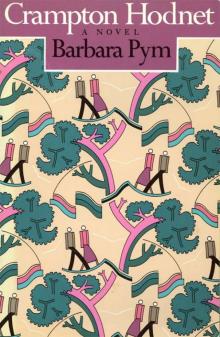 Crampton Hodnet
Crampton Hodnet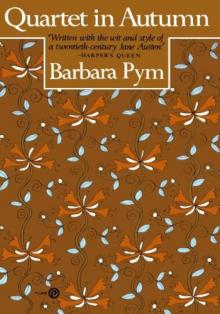 Quartet in Autumn
Quartet in Autumn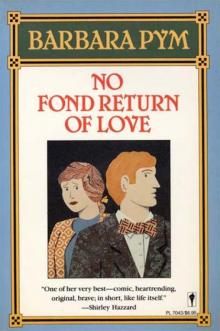 No Fond Return of Love
No Fond Return of Love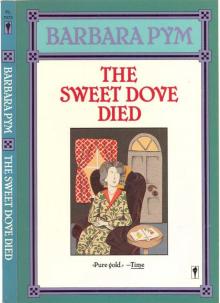 The Sweet Dove Died
The Sweet Dove Died Excellent Women
Excellent Women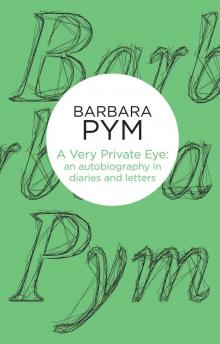 A Very Private Eye: The Diaries, Letters and Notebooks of Barbara Pym
A Very Private Eye: The Diaries, Letters and Notebooks of Barbara Pym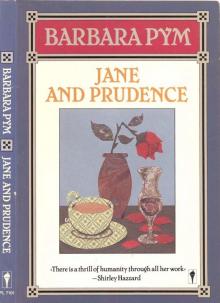 Jane and Prudence
Jane and Prudence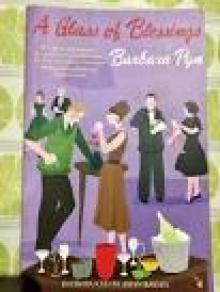 A Glass of Blessings
A Glass of Blessings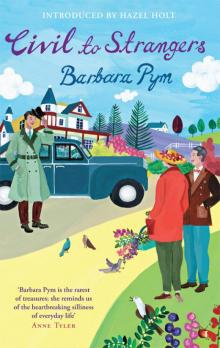 Civil to Strangers and Other Writings
Civil to Strangers and Other Writings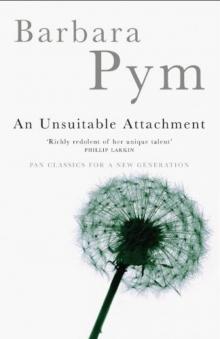 An Unsuitable Attachment
An Unsuitable Attachment Less Than Angels
Less Than Angels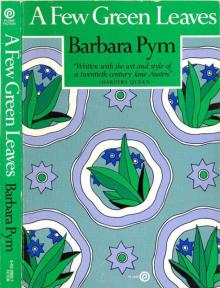 A Few Green Leaves
A Few Green Leaves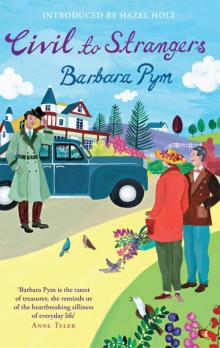 Civil to Strangers
Civil to Strangers